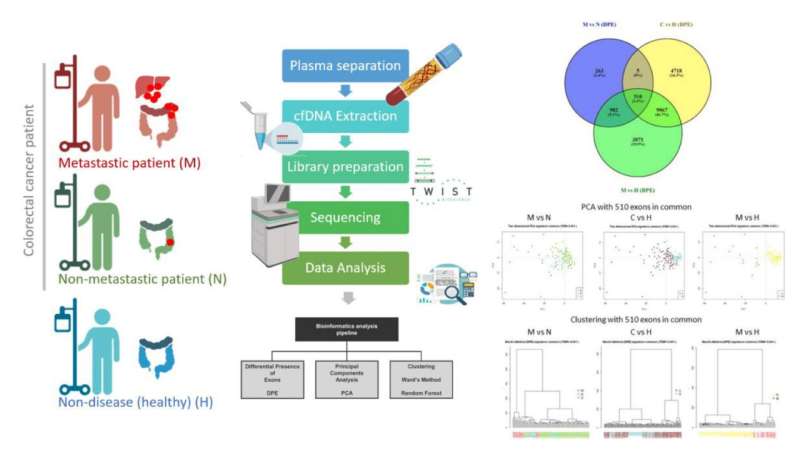This article has been reviewed according to Science X's editorial process and policies. Editors have highlighted the following attributes while ensuring the content's credibility:
fact-checked
proofread
New method of clustering colorectal cancer patients using DPE sequencing

Colorectal cancer (CRC) is a heterogeneous disease that occurs in the colon and the rectum, parts of the gastrointestinal system. CRC is the third leading cause of cancer-related death worldwide. The incidence and mortality of CRC is expected to increase significantly in the future, with more than 2.2 million new cases and 1.1 million deaths expected by 2030.
Metastasis is the leading cause of death in CRC patients, especially liver metastasis. According to previous studies, about 25% of CRC cases are clinically diagnosed with liver metastases in early stages, and about 50% of CRC patients experience symptoms of liver metastases throughout the course of the disease. Differential presence of exons (DPE) by next generation sequencing (NGS) is an innovative method to analyze the complete exome sequence and can be used as a stratification and predictive tool in patients with colorectal cancer (CRC).
In a new editorial paper published in Oncoscience on March 23, 2023, entitled, "New method of clustering colorectal cancer patients using differential presence of exons (DPE) sequencing," researchers David Rubio-Mangas, Mariano García-Arranz, Javier Suela and Damian GarcíaOlmo from Instituto de Investigación Sanitaria Fundación Jiménez Díaz, Universidad Autónoma de Madrid and Hospital Fundación Jiménez Díaz discuss DPE analysis as an emerging and promising technique in the field of liquid biopsy that has the advantage of being non-invasive compared to invasive diagnostic techniques. In addition, this analysis can provide valuable information on CRC progression and could provide information on response to therapy.
"The use of liquid biopsy in clinical practice may also reduce the costs and time required for staging CRC patients, which could have implications for diagnosis and treatment," claim the researchers.
More information: David Rubio-Mangas et al, New method of clustering colorectal cancer patients using differential presence of exons (DPE) sequencing, Oncoscience (2023). DOI: 10.18632/oncoscience.573




















